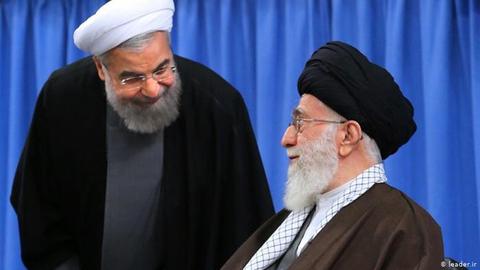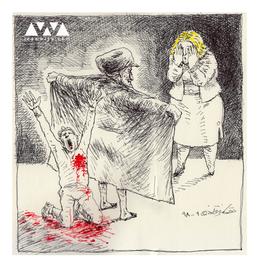President Rouhani, government officials and reformist politicians have all faced criticism for their attitudes toward and insults and threats against protesters voicing anger and frustration over the rise in fuel prices.
Rouhani has referred to protesters as "subversive elements" backed by the United States, Israel and Saudi Arabia, reminding many of a speech he gave on on July 14, 1999 while he was Secretary of the Supreme National Security Council. At the time, he threatened student protesters that if the government had not intervened, they would have been torn “to pieces” by “young revolutionaries” who had tasked themselves with defending the Islamic Republic. [Persian video].
Reformist politicians have also faced criticism, either for their support of Rouhani and criticism of the recent protests or for remaining silent about the unrest.
When the protests began on November 15, some reformists, including Saeed Leylaz, an economist, journalist and a former advisor to President Khatami, and sociologist and political activist Mohammad Reza Jalaeipour came out in defense of the increase in gas prices.
On Saturday, November 16, when the protests had really got underway, 77 reformist figures issued a statement objecting to the crackdown on protesters [Persian link]. It said that shooting ordinary, unarmed citizens who had taken to the streets to protest or express their anger using guns paid for by the public treasury was an unjustifiable crime, and called for the judiciary to immediately hold those responsible to account, regardless of what the protests were about.
Deadly Silence
However, after the protests intensified, reformists remained largely silent on the crisis, refusing to say anything about the deaths of at least 100 protesters. The few who did speak up condemned what they called the “destruction of public property” by protesters. One of them was Dr. Ali Shakouri-Rad, Secretary General of the reformist Union of Islamic Iran People’s Party. “It is only natural that people want to somehow protest the increase in gas prices that will inevitably cause a new round of inflation and put pressure on their lives,” he tweeted. “But it appears that riots, pillage, destruction of public property and creating mayhem is instigated by [those] who want to bring down the government and the regime.”
Mostafa Tajzadeh, deputy interior minister under president Khatami, who served seven years in prison after the disputed 2009 presidential election, appeared to show rare support for the demonstrators. “Peaceful civil protest by people against lawful decisions by the institutions of the government is their right, let alone when such decisions are unlawful,” Tajzadeh tweeted. But he then went on to comment on the destructive nature of the protests. “A society achieves maturity when it avoids violence and destruction of public property and when the government listens to protesters and reaches an understanding with them instead of suppressing them.”
Some people felt these comments on Twitter were so detached from the reality on the ground that they responded with fierce criticism, including sarcastic comments about most Iranians being cut off from the internet while some people enjoyed the special privilege of having access to it so they could go on to Twitter to present useless opinions.
In fact, many people have pointed out that the reformists’ attitudes bear a strong resemblance to that of principlist conservatives during the 2009 protests. At the time, the conservatives were not happy with Mahmoud Ahmadinejad, but they could not endorse such levels of protest against the regime.
Protesters are “vultures”
In fact, reformists have a record of not supporting public outcries. They behaved in a similar way during nationwide protests in late 2017 and early 2018. At that time, Hamidreza Jalaeipour, a member of the Central Council of the Union of Islamic Iran People’s Party, famously said, “We must keep a watchful eye on the vultures who want to bring down the system.’” He later tried to salvage the situation by saying that by “vultures” he meant “Trump, Netanyahu, [Saudi Crown Prince Mohammad] bin Salman and anti-Iranians who, like vultures, fly around Iranian skies” [Persian link].
At the time, the reformists theorized that the protests were the work of Rouhani’s opponents, an attempted coup d’état against him and his government. They have not, however, offered the same theory about recent protests because the decision to increase gas prices was made by the heads of all three branches of government.
So why are the reformists treating these protests exactly the same way they treated the protests in late 2017 and early 2018? Probably it goes back to the famous chant protesters called out almost two years ago: “Reformists, Principlists: It’s over!” The reformists fear that if the protesters go any further, they will be targeted as well. Over the last 22 years, the reformists have always promoted a change in government from the inside – essentially promoting reformism. They fear that protests could mean the end to this approach, and an end to reformism as a viable political option.
Related Coverage:
Four Days That Shook Iran, 20 November 2019
Shutting Down the Internet to Get Away with Murder, 19 November 2019
Who Decided to Raise the Price of Gas in Iran and Why?, 18 November 2019
Iran Pulls a “North Korea” by Cutting off Internet in Response to Protests, 17 November 2019
Iran Bans Journalists From Reporting on Protests, 17 November 2019
People Have Left the Reformists Behind, 2 January 2018
Why Reformists Do Not Empathize with the Protesters, 2 January 2018
visit the accountability section
In this section of Iran Wire, you can contact the officials and launch your campaign for various problems


























comments